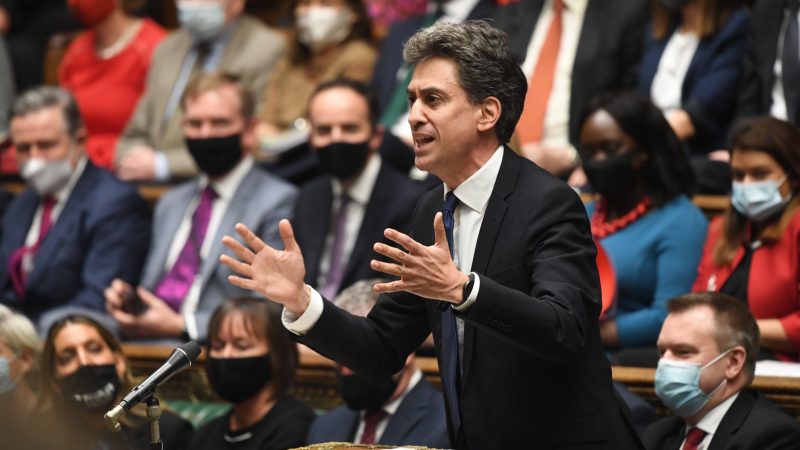
Ed Miliband has urged Tory MPs to support a Labour amendment calling for a windfall tax on the profits of oil and gas companies, describing the government’s refusal to back Labour’s proposal as “shameful”.
Labour’s amendment will be voted on today during the Queen’s Speech debate on the cost of living. It proposes to “respectfully regret” that the Queen’s Speech failed to announce a windfall tax “in order to provide much-needed relief from energy price increases for households”.
The Shadow Climate Change and Net Zero Secretary said: “As energy bills rise by record amounts for millions of families, it is shameful that Boris Johnson and Rishi Sunak still refuse to back a windfall tax that could help tackle the cost of living crisis.
“Today, Labour will give MPs another chance to support our one-off windfall tax on oil and gas producer profits to bring down bills. This fair and principled measure now has support from business, trade unions, across the political spectrum and most importantly, the overwhelming majority of the public.
“Conservative MPs must now join the British people in calling for a windfall tax – or explain why they continue to oppose measures that would ease the cost-of-living crisis.”
Labour first called on the government to introduce a windfall tax in January. The party proposes to use the revenue raised to fund a VAT cut on home energy bills and expand the Warm Homes Discount.
Announcing the proposal in January, Shadow Chancellor Rachel Reeves cited the “record profits” made by oil and gas companies as energy bills have risen sharply, adding: “It is right to ask those who have benefited from higher gas and oil prices to pay more into the system.”
The opposition party released new analysis on Sunday which revealed that the expected profits of North Sea oil and gas firms in 2022-23 are higher than the combined rise in energy bills for every household in the UK.
Labour noted that BP and Shell alone have made £12.37bn of profit in the first three months of 2022. Shell announced a record quarterly profit of $9.1bn (£7.3bn), compared to profits of $3.2bn in the first quarter of last year.
BP reported its highest quarterly profits in more than a decade. Its profits more than doubled in the first three months of the year to $6.2bn (£5bn), compared to reported profits of $2.6bn for the same period last year.
Boris Johnson said last week that he did not think that windfall taxes are the “right way forward”, though he refused to rule out introducing such a tax, saying instead that he did not “like them”.
The Prime Minister added: “The disadvantage with those sorts of taxes is that they deter investment in the very things that they need to be investing in – new technology, in new energy supply.”
Chancellor Rishi Sunak suggested in April that he would consider introducing a windfall tax if energy companies failed to invest sufficiently in the UK and its energy security, saying: “Nothing is ever off the table in these things.”
Business Secretary Kwasi Kwarteng reiterated his opposition to a windfall tax on Sunday but admitted that it would be “foolish” for the Chancellor to rule anything out four months before the Budget.




More from LabourList
‘SEND reforms are a crucial test of the opportunity mission’
Delivering in Government: your weekly round up of good news Labour stories
Labour place third in Gorton and Denton by-election as Greens gain seat